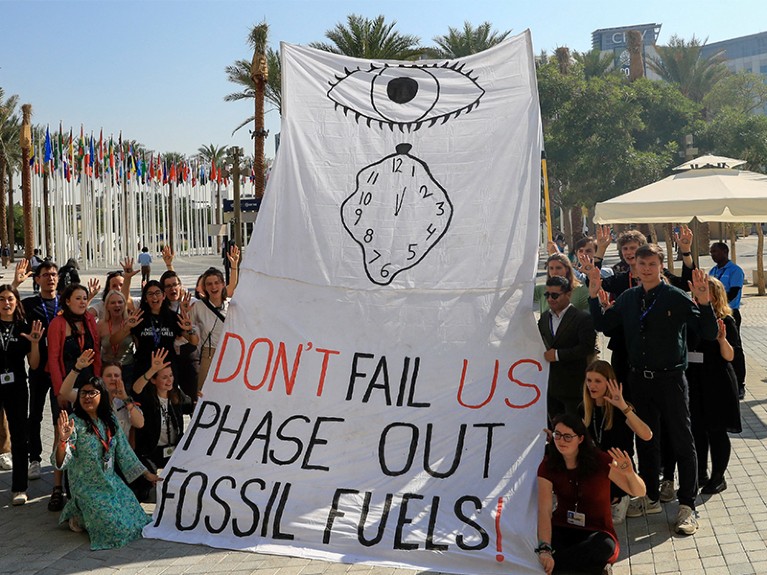Arguments over phasing out fossil fuels dominated COP28 in Dubai, United Arab Emirates.Credit: Thomas Mukoya/Reuters
Sultan Al Jaber, the host and president of COP28, this year’s United Nations climate conference, sparked an outcry before the meeting kicked off in Dubai, United Arab Emirates. At an online event on 21 November, he said that there is no science to suggest that a ‘phase out’ of fossil fuels is necessary to restrict global warming to 1.5 °C above pre-industrial temperatures. Although Al Jaber later tried to defuse the controversy, the episode was a telling prelude to a summit that has been dominated by outdated arguments over what science does — and does not — say about the largest source of humanity’s greenhouse-gas emissions. The event had moved into extra time as this editorial went to press. But it looked very likely that the final agreement would not include language on phasing out fossil fuels. That is more than a missed opportunity. It is dangerous.
The research itself is not the issue. According to the latest estimates, the world would need to eliminate emissions of carbon dioxide in little more than a decade, while also slashing those of methane and other greenhouse gases, to have even a 50% chance of limiting average warming to 1.5 °C above pre-industrial levels. That equation changes, however, if humans are able to extract CO2 from the atmosphere on an industrial scale. Here lies the crux of the debate.

Catastrophic change looms as Earth nears climate ‘tipping points’, report says
Estimates from the Intergovernmental Panel on Climate Change (IPCC) are often the basis of pledges on achieving ‘net zero’ emissions by mid-century. Less discussed is what comes next: what actual actions should be taken. In nearly all pathways to keeping global warming below 1.5 °C assessed by the IPCC, temperatures temporarily overshoot that goal. It is only through large-scale removal of atmospheric carbon, or through negative emissions, that temperatures are brought back down by the end of the century. The models also show continued use of fossil fuels in some industries, notably aviation, where there are currently few viable alternatives.
This creates wiggle room that many leaders around the world — and particularly those representing countries that rely on fossil fuels to power their economies — are keen to exploit.
Al Jaber, who is chief executive of the Abu Dhabi National Oil Company, is but one example. The United States under President Joe Biden is another. It supports calls to phase out fossil fuels, yet is taking record amounts of oil and gas out of the ground. India, led by Prime Minister Narendra Modi, is expanding renewable energy. But the nation — which has an ambition to represent the interests of poor countries — is also continuing to build coal-burning power plants, which supplied nearly three-quarters of its electricity last year.

India and climate: what does the world’s most populous nation want from COP28?
Wealthy countries need to lead the way. This means not only slashing emissions and driving down the costs of clean-energy technologies, but also providing financial aid to help the poorest countries do their part. Yet world leaders have failed to come up with enough funds.
In the end, the climate doesn’t care who emits greenhouse gases. There is only one viable path forward, and that is for everybody to phase out almost all fossil fuels as quickly as possible. More than 100 countries supported that message in Dubai, but their efforts to secure an agreement on a fossil-fuel phase out look to be coming up short. This runs counter to the core goals laid down in the 2015 Paris climate agreement. The time will come when fossil fuels must go. It is a question of when, not if.
Curbing emissions
To be fair, COP28 has had its successes. Most notably, on the first day of the meeting, global leaders established a ‘loss and damage fund’ to help pay for harm caused by mounting climate impacts. The fund has attracted more than US$700 million — and although it is a substantial sum, that’s only a fraction of what will be needed. As is becoming something of a tradition, the meeting’s first week also produced a suite of commitments from businesses and governments; this year’s summit emphasized the impact of climate change on food systems and on public health.

Scientists skip COP28 to demand climate action at home
Crucially, more than 120 countries pledged to triple the world’s renewable-energy generation capacity by 2030. This commitment would provide a large step forward, in part because it focuses on near-term action rather than long-term hope.
But no amount of clean energy is going to prevent further global warming without a concurrent phase out of fossil fuels or, at least, sequestering the associated greenhouse-gas emissions. Doing so will be neither easy nor painless. Political leaders worldwide will face pressure because of entrenched economic interests in their unextracted mineral assets. Fossil-fuel producers, such as the United Arab Emirates and the United States, will need to find other sources of revenue and create different jobs for their citizens. Policymakers must also look for ways to ensure that the burden of a phase out does not fall on the world’s poorest citizens. This is not only the right thing to do, but will also be crucial to prevent political blowback against climate policies.
In the short term at least, the world is all but certain to overshoot the 1.5 °C goal. But there is nothing special about this threshold: this year’s climate extremes have made it all too clear that there is no truly safe level of warming, and every fraction of a degree matters. The main agenda must be to cut emissions as quickly as possible in an effort to head off expensive and potentially irreversible damage.
The time to act is now.
